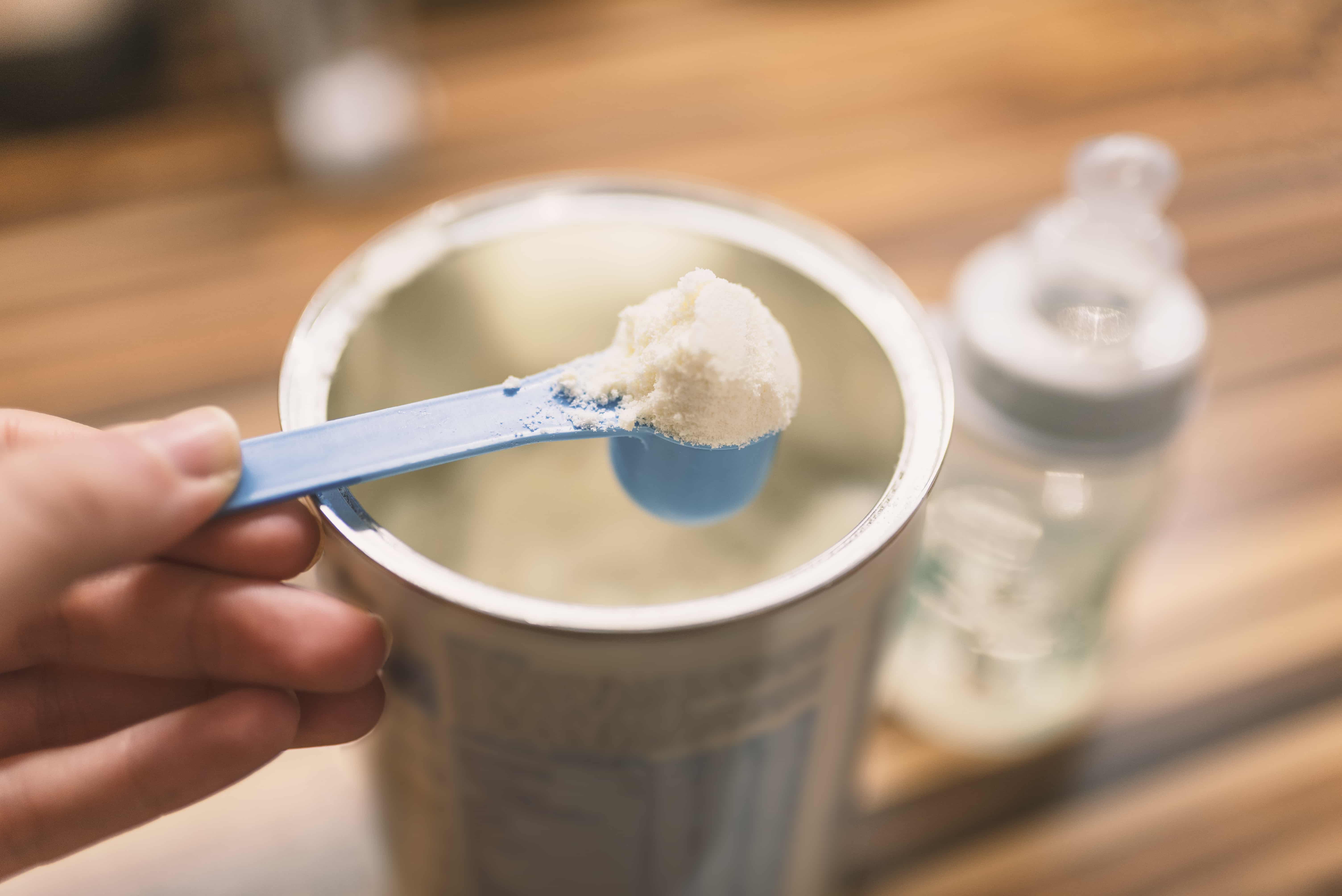Constipation. We’ve all had it at one point or another and I think we can all agree- it’s not fun.
Seeing your little one trying hard to poop with nothing coming can be hard to watch as a parent!
Just recently our 3-month-old son was battling with constipation.
Luckily- we were able to help him get through it, and now he’s on track and pooping daily- Yay!
Signs of Constipation In Babies
Knowing what signs to look for when trying to determine if your baby is constipated is important!
Our son had several of these signs, which led us to the conclusion that he was in fact constipated.
Infrequent pooping
This one may seem pretty obvious, but trying to determine the frequency of your baby’s poops can sometimes be tricky!
As new parents, we’re always tired- especially if you are living with a newborn. So trying to remember your baby’s pooping schedule can be next to impossible!
Greg and I quickly learned that we needed to keep a schedule of babies bowel movements, among other things.
I highly recommend you create a baby log of your own- or use our free template below!
This is a super helpful tool that really helped us in the beginning.
Remember, just like adults- baby’s pooping schedules are a little different from child to child.
There isn’t a hard rule here stating how often your baby should be pooping. Generally, it eventually should be at least once a day, but sometimes that isn’t always the case!
Hard belly
This one is an easy one to check for. Gently press on your baby’s tummy, if it feels hard- then it could be a sign they’re constipated or bloated.
I can tell you from personal experience that this is usually what I check first, as it’s a quick and fairly accurate way to gauge constipation.
Once your baby goes poop and starts passing gas, you should notice their belly starting to soften up and not feel as hard to the touch.
Clay like / hard poop
When I first came across this with our son I was really surprised to see it- but afterward, it made total sense why he was so bound up!
Clay-like and hard poop is typically seen with formula-fed babies. This is because formula takes longer, and is more difficult to digest than breastmilk.
Breastmilk will give your baby’s poop a runnier- more seedy consistency. Whereas formula will not.
If your baby is formula-fed, you may want to consider switching it to another brand. We did this and we noticed results pretty quickly.
Blood in poop
Blood in poop is always something that you should be on the lookout for. And not just for babies- for you as well!
Bloody poop can indicate different things…
But it’s likely a tear in the anus, which can happen from a large, hard poop.
If you do end up seeing blood in your baby’s poop- you should consider calling the pediatrician. That way, other more serious complications can be ruled out.
A long period of straining or crying while pooping
An important thing to remember here is that straining or whimpering while trying to poop can be a normal thing for some babies.
Remember- all babies are slightly different, so this is where monitoring your baby’s pooping habits over time can really be helpful.
However, if baby continues to strain, cry or face starts to become red- these could all be signs of constipation.
I can tell you from my own experience that our son does lift his legs, grunts, and crinkles his forehead when trying to poop. Sometimes his face even turns red.
The key is to monitor how much effort they’re having to put in to pass a poop!
Remember mama, no one knows your child better than you. So trust your gut!
Causes of Constipation in Babies
Depending on how old, and what stage of growth your baby is in- there can be several likely causes of constipation.
Exclusively formula-fed
As I mentioned earlier, babies who are exclusively fed formula are more likely to become constipated than those who are breastfed. This is another great benefit of breastfeeding!
Formula is more difficult to digest for baby, as a result, it takes longer to make its way through baby’s digestive system.
This is also why they seem to sleep harder and longer than those babies who are breastfed!

If your baby is dealing with constipation and they’re drinking formula- be sure that you’re mixing it properly.
Not mixing it properly usually means that baby isn’t getting enough fluids, which can lead to constipation.
You could also try switching the formula to another brand. Look for one that has a probiotic in it. Probiotics are important for gut health which relates back to constipation.
We switched to HiPP and within a day or two, we noticed a difference! HiPP also has probiotics in it so that’s another plus!
Eating Solid Food
If your baby is at the 6 + month mark, then you’re likely starting to introduce some solid foods to them.
Great!
But be mindful, this transition period of solid foods can cause constipation for baby.
Be sure to look at the types of solid foods you’re giving baby. Focus on high fiber, and low sugar.
Mama’s diet
Even after birth mama’s health and lifestyle choices can play a direct role in their baby’s wellbeing!
If you notice your baby starting to become constipated, start keeping track of the different foods you eat- and start eliminating some of them.
Look for improvement. If there is none, then try eliminating other foods that you eat daily.
One of the first you may want to start with is dairy. Dairy is known to cause constipation for both adults and babies!
Besides dairy, cleaning up your diet is always a good idea. Less sugar, eliminate processed foods. Eat organic whenever possible.
Remember, what you eat- gets passed onto your baby through your breastmilk!
Not getting enough liquid
This one is a super important one. I cannot overstate the importance water is to your health and the health of your baby.
Infants get their water through breastmilk or formula. If baby is latching poorly, is fussy or does not seem to be gaining weight- these could all be signs that they’re not getting enough breastmilk or formula.
This can lead to dehydration over time.
Our bodies are made up of nearly 60% water. Mama, make sure you’re drinking enough!
You should be drinking half your body weight in fluid ounces per day. This is especially important while breastfeeding, as your body needs more water than normal to produce breastmilk.
6 Natural Remedies For Constipation In Babies
As natural-minded parents, we’re always looking for alternatives to drugs and medications. Greg and I were happy to discover that there are many things parents can do to help their children with constipation!
1. Massage
Massage is my favorite way to help our little guy pass his poops! For us, massage has worked very well.
There are two main ways to massage your baby’s tummy to help them poop.
First method- Rub their tummy gently and slowly in a clockwise direction. Be careful not to press down too hard.
Their tummy will likely be firm to the touch and it may cause them some discomfort. If it does, then try the second method…

Second method- place your fingers on the sides of baby’s tummy. Slowly massage and pull towards the front and downward. This one has worked very well.
The idea behind massaging the tummy and intestines is that it’ll help stimulate those areas and encourage the digesting food and poop to move on through!
2. Warm Bath
Placing your baby in a warm bath is a great way to help them pass a poop.
The warmth from the water really helps to stimulate the digestive system- which is what your baby needs when constipated and trying to go poop.
Just be prepared for a messy bathtub when it works!
I’ll also pour warm water over baby and massage their tummy as well.
Our little guys LOVES this and immediately starts cooing! So cute 🙂
3. Exercise
Exercise is really important- not just for bone and muscle strength, but for digestion as well!
Our digestive system uses movement as a way to help stimulate it- just like the massage that I mentioned earlier.
If your baby isn’t crawling yet, placing them on their back and moving their legs in a bicycle kick motion is a great way to simulate physical exercise.
You could also place them on their stomach for some tummy time. However, keep in mind that if their stomach is hard and pushed out- tummy time may not be comfortable for them!
4. Diet changes
Baby’s diet can play a role in constipation as well… so there are a couple of things to keep in mind here
Consider switching up formula
Some baby’s don’t react well to certain formulas. This isn’t uncommon!
Try switching types or brands. We started out with Earth’s Best, but ended up switching to HiPP. After a day or two we saw significant changes and since switching- there’s been little to no constipation in our son!
HiPP is a European formula that doesn’t contain soy- but contains probiotics! This is super helpful when dealing with constipation.
Breastfeeding
Breastmilk is easier than formula for baby to digest. So if you’re currently formula feeding your child- try and get some breast milk into them if you’re able.
Avoid high sugar and processed foods
Sugar and processed foods are not able to be easily absorbed into the body which can cause constipation. So avoid those sugary drinks and snacks, and if it’s processed- stay away!
High Fiber Foods
Just like adults- baby’s need fiber too! If your child is eating solid food- try to give them more foods that have higher fiber content.
Things like pears, plums, peaches, or prunes- all contain a high amount of fiber and are known to help those who have constipation.
5. Homeopathics
Homeopathics can be very effective at treating acute problems like constipation.
The following remedies have been known to help with constipation…
- Alumina
- Bryonia
- Calcarea Carb
- Nux Vomica
- Sepia
- Silicea
The trick with Homeopathics is finding the right one. Not all listed above will help your little one with their constipation.
The correct homeopathic match must be found in order for it to work.
The best way I’ve found to use Homeopathics is to find a good book on the subject. The one I use is Homeopathic Medicine for Children and Infants. This is a great book and I’m really glad I bought it. It gives clear definitions of the remedies and which ones to use for a symptom.
Best of all it’s easy to read!
6. Probiotics
Probiotics are something that often gets overlooked in babies and can play a big role when it comes to constipation. Having good gut health is extremely important in order to maintain a proper balance within the body- especially when it comes to digestion.
Consider switching to a formula like HiPP that has probiotics in it already, or you can purchase probiotic supplements to give to your baby.
We use a powdered probiotic that we mix in with our baby’s formula bottle. If you’re exclusively breastfeeding you could also apply the powder to your nipples right before baby latches.
Be sure to talk to your pediatrician first before giving anything other than breastmilk to your baby.
Know When To Get Help
Guys- this is a big one! As much as us natural mama’s want to help our little ones on our own using a more natural approach, it’s important to know when to get your baby’s pediatrician involved.
There isn’t a strict rule of how often your baby should be pooping. But in general, if your baby hasn’t pooped within 5-8 days- you will likely want to get help from the pediatrician.
Generally speaking, your baby should be pooping once every day of like up till day 5. So by day 5, they’re pooping 5 times a day!
However, by week 6 they may not poop every day. They may only go every 2-3 days.
Our little guy is not 10 weeks old and seems to be pooping once a day consistently now!
Preventing Constipation in Babies
As crunchy parents, we’re always interested in prevention rather than correcting the problem after it’s already here.
One of the best ways to reduce the chances of constipation is to make sure your baby is getting enough water!
They have to stay hydrated- just like you!
Whether it’s through breastfeeding, formula, or actually drinking water once they’re old enough for it.
Other important ways to prevent constipation like I already mentioned are exercise, a good diet, and probiotics.
If you’re proactive about it, you can greatly reduce the likelihood your baby’s plumbing gets clogged up!
What’s the longest your baby has gone without pooping and what did you do to get them pooping again? Tell us what you did- we’d love to hear it!







0 Comments